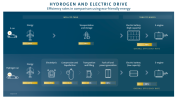According to the traction decarbonisation network strategy it is the most expensive option by far, but might be the best option for very long, very low usage lines without any rail freight
To be fair we really don’t know where the price will settle at this point. So many variables. Anyone taking their bet on offshore wind in the early days was called mad - accused of risking economic travesty. It is now super cheap, cheaper than fossil fuels and that has been achieved in super quick time.
This is one of the challenges with decarbonisation. Working out where everything will settle in real terms and also in comparison with each other.
One example is buried network - which is a big civils cost in several solutions. Nightmare to manage but there are solutions starting to come through that could massively shift the economics.
Offshore wind should provide plenty of optimism though.
You need to define what you mean by "truly green". In my opinion it does not exist. It is incredibly inefficient. There has also been a recent report that it is not neutral as fas as GHGs are concerned. I will try and post the link. Batteries, wind and solar are not green. It is a bit like saying if we burn biomass it is green. That is laughable.
You need to define what you mean by "truly green". In my opinion it does not exist. It is incredibly inefficient. There has also been a recent report that it is not neutral as fas as GHGs are concerned. I will try and post the link. Batteries, wind and solar are not green. It is a bit like saying if we burn biomass it is green. That is laughable.
Fair comment on defining ‘truly green’. Green hydrogen does have the potential to be quite good across the whole of its value chain though. That said, I do think there is a real danger hydrogen is being over hyped.
The embedded carbon/resource (precious metals etc) points are very important, I agree. That said, are you saying batteries, solar and wind produce more GHG than fossil fuels?
Biomass - totally agree that has been overhyped, applied stupidly etc. We seem to be seeing a big dialing back on that globally which is good.
I would not make big systemic bets yet and concentrate instead on picking off chunky but pretty much no brainier, no regrets, ideation that offers maximum bang for the buck, all things being equal, at the end of the day.
Leaving the language debate aside for a second, an example for me is TRU. We should have had an electrified east west line connecting 8 million people really some time ago. Before we worry too much about the Whitby branch line , let’s at least get on with doing that well.
It is fairly easy to set aside a reasonable amount of innovation funding to push the other tech to decision making points whilst getting on with things that should be done in any case today. To be fair, the Government has not been bad at that recently. There are lots of money around and they are being used to produce demonstrators. We are also seeing some of that work happen here in the UK which I am personally keen to support seems as how the baby boomer generation has allowed the UK to lose out to others in terms of rail manufacturing capacity and capability. (Drops mic, runs)

